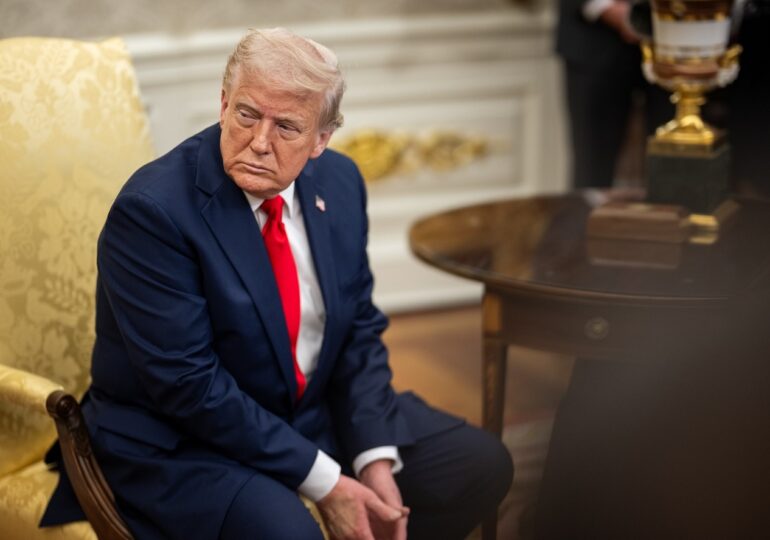US President Donald Trump is considering imposing sanctions against Moscow this week, as he is frustrated by Russia’s ongoing attacks on Ukraine and the slow pace of peace talks, according to sources in the American administration.
The restrictions likely will not include new banking sanctions, one person said, but other options are being discussed to pressure Vladimir Putin to make concessions at the negotiating table, including a 30-day ceasefire supported by Ukraine, which Russia has clearly rejected, writes Wall Street Journal.
Trump spoke on Sunday about the possibility of imposing new sanctions on Russia, saying he is considering them, but also had a nervous outburst against Putin. "He's killing a lot of people," Trump said about Putin. "I don't know what's wrong with him. What the hell is happening with him?"
Additionally, Trump is fed up with the stalled peace negotiations and is considering abandoning them altogether if a final push does not yield results, people familiar with the workings of the American president said, a remarkable shift for a leader who campaigned on his ability to end the conflict on his first day in office.
It is not clear what would happen if the US withdraws from the peace process and if Trump will continue to provide military support to Ukraine, the cited newspaper notes.
Trump is fed up with war and words
These developments mark a new deterioration in relations between the US and Russia, punctuated by ups and downs, even in recent months. Trump took over his second term as president believing he was in a unique position to improve ties between the two countries, thanks to what he saw as his strong personal relationship with Putin.
However, despite his openness and transactional nature, Trump has failed to secure major concessions from the Russian leader for a negotiated peace with Ukraine, and Putin has recently escalated offensive operations in Ukraine.
Just hours after Trump's comments on Sunday, Russia launched the largest drone and missile attack on Ukraine. Ukrainian air forces announced that Russia had launched over 350 explosive drones and at least nine cruise missiles. The Russians called the strikes retaliatory for Ukrainian bombardments on Russian soil.
On Monday, German Chancellor Friedrich Merz stated that the US, Germany, France, and the United Kingdom will no longer impose restrictions on the range of action for the use of weapons supplied by Western allies by Ukraine. Kiev could now target deeper military positions in Russia.
So far, Ukraine has only been able to use long-range Western missiles against Russian troops at a certain distance. The Biden administration opposed lifting the action limits, fearing it could escalate the war.
The White House did not comment on the restrictions, and the United States has not officially lifted all restrictions imposed by the Biden administration on the use of long-range missiles. However, President Donald Trump is "seriously considering" doing so, two senior Western officials said on Monday, quoted by the Washington correspondent of Kyiv Post.
"All previously imposed restrictions – regardless of whether they have already been relaxed or not – are currently under review as the president believes that the current status quo does not serve our common interests in bringing Russia to the negotiating table," said an official without providing further details.
The three things that kept Trump in check
For weeks, Trump resisted pressure to criticize Putin for not agreeing to a ceasefire that Ukraine openly supported. American President's allies, like Republican Senator Lindsey Graham, told Trump that Putin does not want an agreement and only sanctions will make him negotiate seriously, according to WSJ.
But three important viewpoints shaped Trump's thinking, officials said.
First, there was his antipathy towards Ukrainian President Volodymyr Zelensky. On Sunday, when he criticized Putin, Trump also rebuked the Kiev leader in a social media post, saying the Ukrainian leader "does no favor to his country by speaking as he does."
Trump also believed that additional sanctions on Russia would not diminish its ability to continue the war but would hinder efforts to revive economic ties between the US and Russia.
Lastly, Trump felt he knew Putin and that the Russian leader would end the war as a personal favor. The fact that Putin showed no serious signs of yielding worsened Trump's opinion of his counterpart, especially after last week's phone call during which Putin refused to accept a ceasefire.
All US presidents who believed in Putin have come to naught
Trump is now on the path taken by several American presidents who believed they could work with Putin, only to find their efforts in vain.
In 2001, George W. Bush said about Putin that he "looked into his eyes" and felt that Putin is "very straightforward and trustworthy." Later, Putin invaded Georgia.
In 2009, Barack Obama and his administration sought a "reset" in relations with Putin, only to be lectured by the Kremlin leader and then see him invade Ukraine and annex Crimea.
During Donald Trump's first administration, Russia continued to support attacks by separatists in Ukraine, and the American president provided offensive weaponry to Ukraine. During the campaign, Trump said Russia would not have started the war in Ukraine if he were in office and repeatedly claimed he could quickly stop the fighting.
"Before even getting to the Oval Office, shortly after we win the presidency together, we will have a terrible war between Russia and Ukraine. It will be resolved," Trump said in July 2023.

